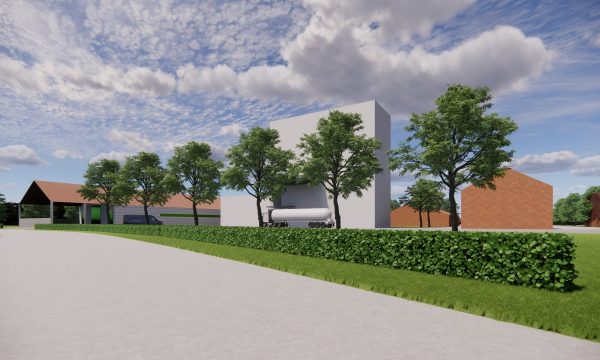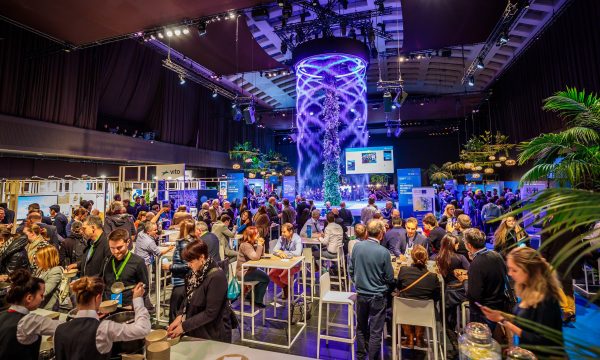Press release From fruit to juice for Food Banks: Technology in local or mobile hubs against food waste
With new technology in a convenient or portable format, it's now possible to stabilize smaller and mixed surplus fruits and vegetables into long-life, natural juices and smoothies. This is evident from tests and analyses by ILVO, in the framework of the EU research project ZeroW. Innovative crushing and pressing technologies appear to be able to convert both hard and soft fruits and vegetables, mixed together, into a tasty juice, which after pasteurization, keeps stably for months at room temperature. These research results will eventually offer perspective to e.g. the Food Banks, who want to offer more healthy fresh and also processed products in their food aid.
During the FTI festival week, ILVO demonstrated at the company Fructus (Cuvelier Group) in Borgloon how linked technology and research create versatile solutions against food waste. Flemish Minister of Economy, Innovation, Work, Social Economy and Agriculture Jo Brouns reviewed the results: 'This innovation has a sustainable and a social dimension: reducing food losses in a systematic way, and having an eye for the rising demand for affordable food. Good that we are also showing this to young people as part of FTI Week, so they can see that they can participate in such social projects through STEM directions.'
Food waste and rising demand at Food Banks
In Flanders, some 866,000 tons of food are lost annually from farm to fork. More than half of this is wasted in households, around 20% of the losses occur during the processing phase, 11% is in primary production. Together with the non-humane edible food waste streams, we are at 3.05 million tons of by-product streams from the agri-food chain in Flanders. Of these, 86% are valorized as animal feed, fermentation source or compost. With its action plan, Flanders is aiming for 30% less food loss compared to 2015, through prevention, and preferably also through reprocessing as human food.
There is a European 'market regulation for fruit and vegetables' for the surplus. This allows free distribution to (recognized) charities. At the Food Banks, meanwhile, the number of food aid clients is rising dramatically. In 2022, 210,000 people registered, up 24.3% in just four years. The amount of food per recipient dropped from 125 kilograms to 110 kilograms per year, or converted 4 meal equivalents per cup per week, instead of 5. In 2022, 56.4% of the products collected by the Food Banks are quality surplus food. One-third (32%) is fresh fruits and vegetables. The limited shelf life of fresh produce means that some of the free donations from auctions or stores are lost anyway. The volunteers do not get them distributed in a timely manner.
Technologically robust, local processing into stable, long-life product
ZeroW's research partners see value in technology so that fresh fruits and vegetables no longer have to disappear in biogas plants for economic or logistical reasons, but end up on the plates of (vulnerable) families. Fruit and vegetable growers also see added value in these developments.
Emma Van Steenweghen (Boerenbond): "There is a need for local biomass hubs such as the ZeroW container equipped with processing technology that allows unavoidable residual flows and surplus fruit and vegetables to be processed year-round. The additional challenge compared to existing balers is that we expect a lot of flexibility. The machine should be widely deployable and should also be able to handle small, even mixed volumes. The final product should be pasteurized, i.e. have a longer shelf life, but above all it should be of high quality and tasty."ZeroW test container yields 6 tasty juices and fruit bars: zero waste
The food technologists within the ZeroW consortium explored innovative technologies: the vacuum spiral filter press (GEA VaquliQ) and the Pulsed Electric Fields technology (ELEA). The tests showed that the vacuum spiral filter press does have broad applicability for a wide variety of fruit and vegetable varieties, including mixed. The PEF technology requires further study to determine the best process parameters for the new recipes....In Borgloon, the processing unit including the PEF technology was temporarily set up, in its container. Such a unit can be moved to places where surpluses arise. A second technological production line was realized by ILVO/Food Pilot together with the fruit processing company Fructus, in which low-acid grinding and pressing was done with the vacuum spiral filter press, in combination with Fructus' pasteurization and filling line.
Bart Van Droogenbroeck (ILVO): "Both hard and soft fruits and vegetables can be processed smoothly and mixed without loss of yield or quality. This is a new achievement, and important for logistical and economic feasibility in the later practical environment. Blending is done at the outset and not afterwards, as is often the case with larger-scale commercial blends. No additional handling is required to remove stalks from cherries, or peels from apples, kiwis or pears. In addition, the processing unit can process several dozen kilograms to half a ton of fruit per hour, unlike existing processing plants that immediately expect larger tonnages in separated streams."
The first quality tests after classic pasteurization are promising: the juices turn out to be of particularly high quality and may have a shelf life of at least 6 to 12 months. From the press cake left after pressing, ILVO has also already made experimental high-fiber fruit bars in the Food Pilot. Up to 20% press cake per bar yields good results. Tests for safety and shelf life are planned in the near future.
In terms of mix recipes, 6 successful, long-life juices have been developed so far. They are pressed from more than 10 ingredients, including apple, pear, cucumber, celery, kiwi, ginger and carrot.
Deployment in sight
The interest to continue on this solution for food losses is present among the professionals involved. Yves Cuvelier and Jo Driesmans of FRUCTUS JUICE are considering investing in their own installation after the test phase: "There are already processing options for hard fruit, but for soft fruit and vegetables it is different. Moreover, this allows us to still valorize the fruit in a sustainable way in the event of a sudden crisis, such as hail damage or unexpected surpluses."
The free distribution to charities, while legally regulated for surplus fresh fruits and vegetables, is currently not applicable to processed products such as packaged juices or smoothies. Etienne Rubens of the Belgian Federation of Food Banks: "We ask that our food aid organizations obtain more fruit and vegetables collected free of charge and also be allowed to have them processed by an external party who compensates them in kind, for example in a certain percentage of the juice produced."
Over ZeroW
ZeroW is a €12 million Green Deal call of the Horizon Programme 2020 research project with 45 international partners from 17 countries, running from 2022 to 2025. ZeroW seeks technological, local solutions to avoid food waste while fighting hunger and food insecurity in Europe. Learn more: www.zerow-project.eu.


